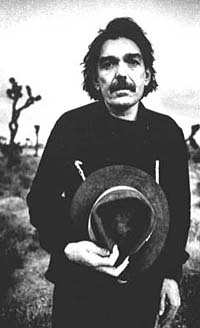|
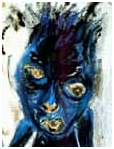 Crepe and Black Lamp (1986)
|
By combining historical awareness and reflection ("Dachau Blues", "The Past Sure is Tense") with the imaginative leaps and bounds of sci-fi and cartoons and fairly tales ("Big Eyed Beans from Venus," "Alice in Blunderland"), and by synthesizing the charcoal-filtered vocal protests of Howlin' Wolf ("I asked her for water, she gave me gasoline") with the unedited squawks, squeaks, and skat of Ornette Coleman, the violence and agression embodied in the blues ("Floppy Boot Stomp") with the lyricism of Marvin Gaye and Otis Redding ("My Head is my only house unless it rains"), Don van Vliet was able to forge one of the most powerful and most eclectic artistic collections of music, poetry and painting in the late 20th century. His music has influenced an entire younger generation that cites him as a model and a prophet, and his enduring legacy can be heard in such music as
The Fall, David Byrne and Talking Heads, Buzzcocks, The Clash, Sex Pistols, Sonic Youth, Billy Bob Thornton, Tom Waits, XTC and many other artists. Having retired from music in 1982, van Vliet now devotes his time to painting. His artistic works have been the subject of exhibitions in New York and Europe.
|
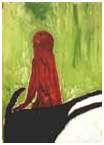 Copper Diver (1986)
|
From his beginnings in the LA area, Beefheart was not a usual rocker. Studying art, steeping himself in the blues, and playing soprano saxophone, he had already made a name for himself when he moved to the Mojave Desert and formed the first Magic Band in 1964. Born in Glendale in 1941, Van Vliet grew up in the Cucamonga area, where he connected with many artistic friends and musicians, one of whom was the guitarist and band-leader Frank Zappa. In 1968, he was signed briefly to A & M records, releasing "Diddy Wah Diddy" as a single, but the subsequent album, far more bizarre and eclectic, later released as the fantastic Safe as Milk, was rejected. He considered going back to art, but Zappa convinced him to record for his then emerging Straight Records labels. Beefheart reformed the Magic Band and produced the critically acclaimed Trout Mask Replica in 1969.
|
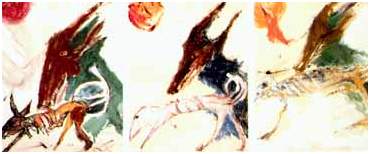 Dylisheus (1984)
|
In the early 70s, Beefheart recorded such gems as Lick my Decals Off, Baby (1970), The Spotlight Kid (1972), and perhaps the greatest party album ever created in the history of Rock n' Roll, Clear Spot, produced with outstanding clarity and range by Ted Templeman. Even though Clear Spot and The Spotlight Kid were far more accessible and far less difficult than the early work, Beefheart continued to fine-tune his artistic vision and remained a critical success with a cult following. In 1974, Beefheart released two commercially intended albums -- Unconditionally Guaranteed and Moonbeams and Bluejeans -- but neither one achieved the goal of making Beefheart's music accesible to an even broader public, and both offended the die-hard Beefheart fans who thought that the Captain had sold his soul to the record industry devil.
|
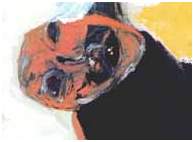 Stagecoach to Hell (1985)
|
Reforming a new Magic Band in 1978, Beefheart returned to his syncopated rhythm and avant-garde roots with powerful performances and the release of the critically acclaimed Shiny Beast (Bat Chain Puller), followed by the riviting Doc at the Radar Station (1980) and the ecologically-minded and haunting Ice Cream for Crow (1982). With guest appearances by the gifted trombonist Bruce Fowler and the excellent guitarist Gary Lucas ("Flavour Bud Living" from Doc at the Radar Station, "Evening Bell" from Ice Cream for Crow), Beefheart was able to present both older and newer material the way in which it was intended to be played and heard -- raw, highly structured, and yet replete with innovative digressions and soaring impromptu improvisations.
|
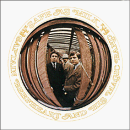 Safe as Milk (1967) |
Safe as Milk, released in 1967, combined polyrythmic syncopation with great rock ramps over which searing guitar work and Van Vliet's delta-infused vocals gain flight. Classics such as Electricity and Click, Clack make this one of Van Vliet's finest sets, demonstrating both his linguistic prowess and his gift for compositional obliqueness, confronting different sounds and textures with one another and integrating them into a disunified sound and vocal montage. In this offering, Van Vliet provides dadaist speech-acts and rumbling harmonica solos as a young Ry Cooder supplies some very edgy steel guitar on the high ones. Both the garage thunder and the avant-garde painter can be witnessed on Safe as Milk, a must-have for any serious Rock collector.
Singin through you to me
Thunderbolts caught easily
Shouts the truth peacefully
Electricity
High voltage man kisses night to bring the light
to those who need to hide their shadow deed
Go into bright find the light and know that friends don't mind
just how you grow
Midnight cowboy stained in black reads dark roads without a map
To free-seeking electricity (repeat) (Repeat both lines)
Lighthouse beacon straight ahead straight ahead across black seas to bring
Seeking electricity
High voltage man kisses night to bring the light to those who need to hide their shadow-deed hide their shadow-deed (repeat)
Seek electricity...
|
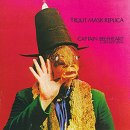 Trout Mask Replica (1969) |
Van Vliet took a giant step in 1969 with the release of Trout Mask Replica. Produced by Zappa, this recording shows Van Vliet developing the low-down
and eclectic mix of the L.A. scene to a new cosmic level in which history begins to emerge, as Joyce said in Ulysses, as "a nightmare" from which one is trying to awaken. Dachau Blues and My human gets me blues move from the Delta to a world-historical and spirtual level of a world abandoned and forsaken, with only one's own
empathetic core to stave off the onslaught of the terror of the "civilized" world.
Dachau blues those poor Jews
Dachau blues those poor Jews
Dachau blues, Dachau blues those poor Jews
Still cryin' 'bout the burnin' back in World War Two's
One mad man six million lose
Down in Dachau blues, down in Dachau blues
The world can't forget that misery
'n the young ones now beggin' the old ones please
t' stop bein' madmen
'fore they have t' tell their children
'bout the burnin's back in World War Three's
War One was balls 'n powder 'n blood 'n snow
War Two rained death 'n showers 'n skeletons
Dancin' 'n screamin' 'n dyin' in the ovens
Cough 'n smoke 'n dyin' by the dozens
Down in Dachau blues
Down in Dachau blues
Sweet little children with doves on their shoulders
Their eyes rolled back in ecstasy cryin'
Please old man stop this misery
They're countin' out the devil
With two fingers on their hands
Beggin' the Lord don't let the third one land
On World War Three
On World War Three
|
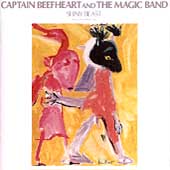 Shiny Beast (Bat Chain Puller) (1978)
Shiny Beast (Bat Chain Puller), released in 1978 after many legal disputes and wrangling between Zappa, Beefheart, and the people at Virgin Records, brought together some of Beefheart's finest compositions, some of which he had written many years before, with some great instrumental work by a new Magic Band, now consisting of Eric Drew Feldman (keyboards), Jeff Morris Tepper (guitars), Bruce Fowler (on "Air Bass"), Robert Williams (drums and percussion), Richard Redus and a cameo performance by Artie Tripp (Ed Marimba) on drums. This work contains many gems of syncophany
and trmendous solos by Don himself. My all-time favorite is "Owed T'Alex," probably written during the Safe as Milk era, in which chop guitar rides on a ramp of air bass with Don's harmonica waving overhead. This is a raucous, profoundly rythmic ode, fusing hard core bluesy electric slide with percussive syncopation and penetrating lyrics. |
Owed T'Alex
Stupid heart, cupid heart
Where will you go from here?
Magnetic ring, magnetic draw
Ooh, what you got me into,
Eyes of a wolf, chrome craw
Leaviní you now
- Iíll writecha, ma...
Takiní a putt up to Carson City
Well, if you hear me howliní
Well hell, sittiní pretty
Tastin' nitty gritty
Puttiní on in to Carson City
Sparks, tattoos, two tats and a toot
Helmets, crosses, and a patch to boot
Engine hot, pipes burnin' white
Glad Iím not home tonight...
Five miles back I took a spill
- Thought I almost paid my bill
Makiní my putt to Carson City
Party time with the Jones' by name
Ah, itís a shame
Say, itís a pity
Gotta put outta Carson City
Ha ha ha ha ha
Ha ha ha ha ha ha
|







